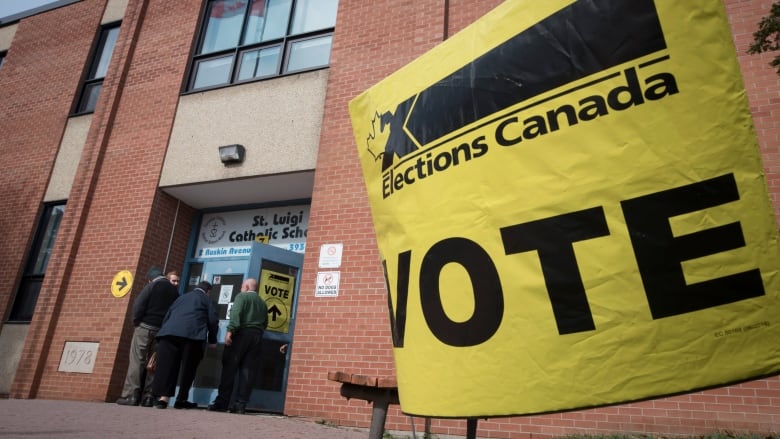Elections Canada says its system protects Canadian voters from U.S.-style drama
American elections are run at the state level, with broad differences in voter registration and voting rules

As some Americans question the legitimacy of an electoral process that has led to drama, delays and prolonged uncertainty in the U.S. presidential race, Canada's elections agency says this country's independent model ensures the voting system is free from political interference.
It's been almost two days since polls closed in the U.S. and there is still no clear winner of the presidential election, with Republican candidate Donald Trump and Democratic challenger Joe Biden still waiting on results from a handful of battleground states.
While Biden has expressed confidence he'll emerge victorious and called for patience as the votes are counted, Trump declared a premature victory for himself in the wee hours of Wednesday morning while claiming widespread voter fraud. His campaign has since launched a series of legal challenges to stop the vote-counting process in multiple states.
Natasha Gauthier, a spokesperson for Elections Canada, said having a centralized agency to oversee federal elections helps Canada avoid some of the contentious debates over voting rights that marred the leadup to the Nov. 3 election and led to the subsequent squabble over the results.
"Having an agency that is independent from the elected government, with a chief electoral officer who is appointed by Parliament as a whole, we are nonpartisan in everything that we do," said Gauthier.
"We are removed from that politicization of the voting system that we see in the U.S."

Elections Canada was created a century ago as an independent, non-partisan body to administer federal elections in Canada's parliamentary system. The chief electoral officer is appointed by a vote of MPs for a 10-year non-renewable term. Returning officers — who are hired by Elections Canada and are required to be nonpartisan — oversee the vote in each of Canada's 338 electoral ridings.
In the U.S., by contrast, elections are administered at the state level. Each state legislature sets different laws and rules that determine the number and locations of polling places, the voter registration process, which pieces of ID are required to vote and the processes for accepting and counting mail-in and absentee ballots.
County clerks, who administer the voting and counting of ballots in the over-3,000 U.S. counties, are elected officials in many states.
Fights over voting rights
The lead-up to election day was marred by brutal fights over voting rights as U.S. state politicians designed rules for voting during the COVID-19 pandemic.
With more voters than ever planning to vote early or by mail, some Republican legislators sought to design rules that would limit voter access in the name of preventing voter fraud. Critics argued they were trying to suppress votes in places where high turnout would benefit Democrats.
A record number of lawsuits were filed contesting the deadline for returning mail ballots, the packaging requirements for ballots and the number of ballot drop-box locations allowed in each county.
Gauthier said the existence of Elections Canada helps Canadians avoid such fights by ensuring the rules surrounding voting are uniform across the country. Elections Canada provides advice to MPs about electoral rules and MPs enshrine them in the Canada Elections Act, Gauthier said.
"The way people vote, the ways to vote, how they are informed to vote, where they can vote, registration, the types of IDs that are acceptable at the polling locations — those are all prescribed by law," Gauthier said.
"So someone voting in Iqaluit will have the same experience at the polling booth as someone voting in downtown Toronto or Vancouver."
I have never appreciated <a href="https://twitter.com/ElectionsCan_E?ref_src=twsrc%5Etfw">@ElectionsCan_E</a> so much! Elections decided by the people, not courts. Consistent rules across the country. Accessible voting and quick counts. Thank you!
—@WilsonTheTwitCanadians took to social media over the past two days to express their gratitude to Elections Canada in response to a Twitter post the agency sent election day that directed people to the Elections Canada website to learn more about what the agency does.
Gauthier said the post was one of its most successful social media posts ever.
Elections America?
Richard Johnston, professor emeritus of political science at the University of B.C., said creating a national agency like Elections Canada to oversee the administration of U.S. presidential elections would ensure uniform voting rules across the country and would simplify the counting process.
But Johnston admitted it would be a challenge to implement.
"The U.S. would be starting now where we were a century ago, and doing so on a scale 10 times as great as the current Canadian situation," he said.
"So it wouldn't be a simple task and my hunch is that the political forces at play in the U.S. would resist it."
Kathleen Hale, director of the graduate program in election administration at Auburn University in Alabama, said any attempt to create a national elections agency would run into legal problems because the U.S. constitution explicitly delegates the authority to administer elections to states.
And both Johnston and Hale point out there are major benefits to the decentralized administration of elections.
"The people who do this work, the people who direct this work, are many times themselves directly elected by the public," said Hale. "So if you don't like the way your election ran in 'X, Y, Z County,' you can vote that person out the next time they're on the ballot."
Johnston said a decentralized system is less prone to takeover by an overzealous president — something that seems especially relevant now, given Trump's attempts to claim victory before all the votes have been counted.
"It's actually harder for an authoritarian figure like Trump to push the whole system in one direction or the other because there's just so many pockets of resistance," said Johnston.
With files from Kathleen Harris
